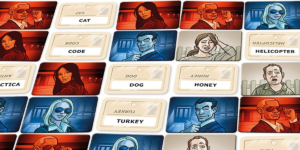
Following extensive evaluations by the U.S. Armed Forces, a novel PC-based video game originally conceived at the University of Southern California Information Sciences Institute is educating thousands of officers and enlisted personnel how to communicate in Iraq safely, effectively, and with cultural sensitivity.
The Tactical Iraqi Language & Culture Training System teaches not only what to say in Iraqi Arabic, but just as importantly how to say it and when to say it. Lessons focus on skills relevant to common, everyday situations and tasks. Cultural awareness covers Iraq’s non-verbal gestures and norms of politeness and etiquette that are most critical to communicate successfully.Trainees learn while having fun by playing immersive, interactive, non-scripted, 3D video games that simulate real- life social interactions involving spoken dialogs and cultural protocols. Trainees “win” the game by correctly speaking to and behaving with computer-generated Iraqi animated characters. If the Iraqis trust the trainee, they cooperate and provide the answers needed to advance in the game. Otherwise, they become uncooperative and prevent the trainee from “winning”. The game has no shooting; trainees must communicate — not shoot — their way to “winning” the game.
The course is not a simple entertainment video game nor a “repeat after me” training program. It is a “serious game” that combines several patent-pending, breakthrough technologies, including computational models of language, culture and learning that guide the behavior of the game’s autonomous, animated characters; and a contextual, speaker-independent speech recognizer for non-native speakers.
Trainees start learning functional communications skills within a few hours of play. From the very first lesson, they listen to and speak in Arabic using a headset microphone, getting immediate feedback and guidance. Many rate the course better than instructor-led classes.
“I wish this was something we had three years ago,” said Cpl. Joshua W. Zeigler, a Marine at Camp Lejeune. “This is a great tool. It doesn’t matter what your aptitude level is, you’re going to learn some proficiency in the [Arabic] language.”
Marine Corps’ units using the Tactical Iraqi course extensively include the 1st Marine Division at Camp Pendleton (California), the Marine Corps Air Ground Combat Center at 29 Palms (California), the U.S. Marine Corps Expeditionary Warfare School at Quantico (Virginia), the II Marine Expeditionary Force at Camp Lejeune (North Carolina), and several sites inside Iraq.
Many units of the Army are also integrating the Tactical Iraqi course into their training programs, including the 3rd Infantry Division at Ft. Stewart, Ft. Benning and Hunter Army Air Field (Georgia), the 1st Infantry Division at Ft. Riley (Kansas), the Command and General Staff College at Ft. Leavenworth (Kansas), and several sites inside Iraq.
Lastly, the U.S. Special Operations Forces Command (USSOCOM) recently started distributing the course to its command language program managers (CLPMs), who are responsible for language training within units of the U.S. Army Special Forces. For instance, USSOCOM gave laptops pre-installed with the Tactical Iraqi course and other language training software to 40 CLPMs at a recent seminar in Ft. Walton Beach (Florida). USSOCOM is also giving hundreds of copies of the course to interested parties in USSOCOM and other units.
The program started in 2003 as a research project at the University of Southern California’s Information Sciences Institute under funding from the Defense Advanced Research Projects Agency (DARPA). DARPA Program Manager Ralph Chatham was inspired to start the program after listening to one of the first soldiers who went into Afghanistan. The captain told how he and his comrades reluctantly rode on tiny ponies into a town, totally relying on their Northern Alliance escorts. However, the escorts could only speak Afghan and a little broken Russian or Arabic, and the U.S. soldiers could only speak English and a little broken Russian or Arabic. When the town’s people came out on the streets the soldiers had no clue of what they were thinking from their gestures, their demeanor or their words.
Dr. Chatham explains, “I wanted to insure that no American soldier or Marine would again have to ride blind into a foreign culture. I challenged the research community to create a training tool that would teach the brain behind every trigger finger and behind every steering wheel a bit of the gestures, culture and mission-oriented vocabulary of the land they were in. I also told the researchers that they had to do this with only two discontinuous weeks of contact time with the students.”
In 2004, USSOCOM agreed with DARPA to support transition of the project into use by the U.S. Army Special Forces. In 2005, the project’s main researchers at USC started the company Tactical Language Training LLC to further develop and commercialize the products.
“The feedback and support that we received from the Marine Corps and USSOCOM were critical in helping us convert our original research university prototype into the successful product that is in use today,” said Dr. W. Lewis Johnson, co- founder and chief scientist of Tactical Language Training LLC, and research professor at the University of Southern California. “We knew that our innovative training approach had the potential to transform how people learn foreign languages and cultures. Thanks to the support by the Marine Corps and USSOCOM, we are seeing this happen.”
Marine Corps interest in the program has been particularly strong. The Marine Corps Expeditionary Warfare School has made it required training for all its students. Marines at all levels are using the program at Camp Lejeune, including junior enlisted as well as general officers and their staffs. To meet the need, Tactical Language Training, LLC has established a website where any member of the U.S. Military can download the software. Non-military learners may also download upon payment of a license fee.
USSOCOM and DARPA are currently funding the development of training courses for Pashto and Sahel French. The Marine Corps is funding development of new game scenarios for Iraqi Arabic that will teach their units how to conduct sensitive missions safely and effectively.
Meanwhile, Tactical Language Training LLC and its parent company, Alelo Inc., are drafting courses in Gulf Arabic, English as a second language, Spanish and Chinese, and planning products for non-military applications in education, healthcare, entertainment and advertising.
About Alelo:
Alelo is the Hawaiian word for “language”, which is at the heart of the company’s mission to transform how people learn to communicate. Initial emphasis is on foreign languages and culture, with plans to expand into broader markets. Alelo’s wholly owned subsidiary Tactical Language Training LLC is dedicated to serving the company’s U.S. military customers.
Published on December 4th, 2006
Last updated on August 9th, 2021










